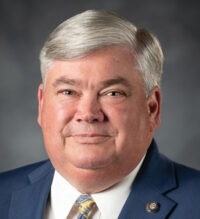 West Virginia state Senator Jack David Woodrum (photo on left) told attendees at the West Virginia Press Association (WVPA) convention last month that he may introduce a bill that would reduce fees for papers in the state that fail to publish notices on their own website and on WVPA’s statewide public notice site, according to a report on WVPA’s member website. The legislation wouldn’t change current laws requiring most notices in the state to be published in local newspapers.
West Virginia state Senator Jack David Woodrum (photo on left) told attendees at the West Virginia Press Association (WVPA) convention last month that he may introduce a bill that would reduce fees for papers in the state that fail to publish notices on their own website and on WVPA’s statewide public notice site, according to a report on WVPA’s member website. The legislation wouldn’t change current laws requiring most notices in the state to be published in local newspapers.
Although the fee-reduction penalty would be novel, the rest of Sen. Woodrum’s proposal would be similar to legislation passed in 20 other states requiring papers that publish notices in print to also post those notices free of charge on their website and/or their state press association’s statewide site. According to a draft of the bill shared at the convention, WVPA would be responsible for monitoring “all newspaper legal advertisements for compliance” and issuing an annual report to the Secretary of State’s office. Papers that fail to meet the compliance standard, which wasn’t precisely defined in the draft, would only be “permitted to charge and receive no more than 85%” of the rates currently set by law.
Earlier this year, Sen. Woodrum introduced a bill that would have reduced public notice fees for all newspapers in the state to 4 cents per word. Current law provides for rates beginning at 5 cents per word for papers with circulation less than 1,000, and rates for other papers ranging from 9.5 cents per word to 12 cents per word, with increases based a sliding scale tied to circulation. The bill died in the Senate without ever getting a committee hearing.
Sen. Woodrum told attendees at the convention that he introduced his rate-reduction bill to “get everybody at the table.” He claimed the tactic worked, which led him to have “a very productive conversation” about the issue in a meeting with newspaper representatives and Senate President Craig Blair, R-Berkeley in attendance.
WV News Publisher Andy Kniceley told WVPA that Woodrum’s bill could come up in a special session this year but that even if it doesn’t newspapers in the state should work to get it passed “before a changing of the guard.”
“We have to do our part whether it gets passed in special session or not.”
Kniceley also told WVPA that newspapers in the state have to publish their notices online before public officials decide to move them to a government website instead. He said the main complaint he hears about printed notices is that they don’t get published in a timely manner.
“Transparency is the most important thing, and having a government entity to put this stuff on their own website, and there’s no accountability … you’ve gotta have a third party,” Kniceley told WVPA. “And that’s a role we have played for 150 years.
Newspaper notice in West Virginia has been under considerable pressure in the state legislature for several years, although the last bill that would have completely eliminated newspaper notice died without a hearing in 2020. In 2021, unclaimed-property notices and county school board notices were moved from newspapers to government websites.
Moreover, multiple bills have been introduced requiring the state auditor to establish and maintain a State Central Legal Advertising website. Several versions of the bill would have eliminated multiple-insertion print notices by allowing all but the first such notice to be published on the state auditor’s site instead of in newspapers. But the version of the legislation that ultimately passed in 2021 maintained all newspaper notices but required state government notices to also be published on the auditor’s site.
 WVPA board member Doug Skaff (photo on right) is presently serving as the association’s interim executive director. Skaff is president of HD Media, which was established in 2013 to purchase the Herald-Dispatch of Huntington, West Virginia, according to Wikipedia. HD Media later bought the Charleston Gazette-Mail after the formerly daily paper declared bankrutcy. HD Media has also scooped up several smaller papers in the region. According to Skaff, the company now owns 15 newspapers and employs 165 people in West Virginia, Ohio and Virginia.
WVPA board member Doug Skaff (photo on right) is presently serving as the association’s interim executive director. Skaff is president of HD Media, which was established in 2013 to purchase the Herald-Dispatch of Huntington, West Virginia, according to Wikipedia. HD Media later bought the Charleston Gazette-Mail after the formerly daily paper declared bankrutcy. HD Media has also scooped up several smaller papers in the region. According to Skaff, the company now owns 15 newspapers and employs 165 people in West Virginia, Ohio and Virginia.
“As newspapers evolve on how they deliver their content we must adapt how we offer legal advertisements and public notices to our audiences,” Skaff told PNRC. “Newspapers continue to be the leading provider of local community news throughout West Virginia and provide the best avenue for public notices to be seen by the most amount of people.”
Skaff was named president of HD Media in 2020, when he was also serving his second stint as a Democrat in West Virginia’s House of Delegates. He stepped down from his position as Minority Leader of the House in Aug. 2023 and resigned from his position in the lower chamber a month later. He later changed his party affiliation to Republican and mounted an ultimately unsuccessful campaign for Secretary of State, placing second in the Republican primary earlier this year.
